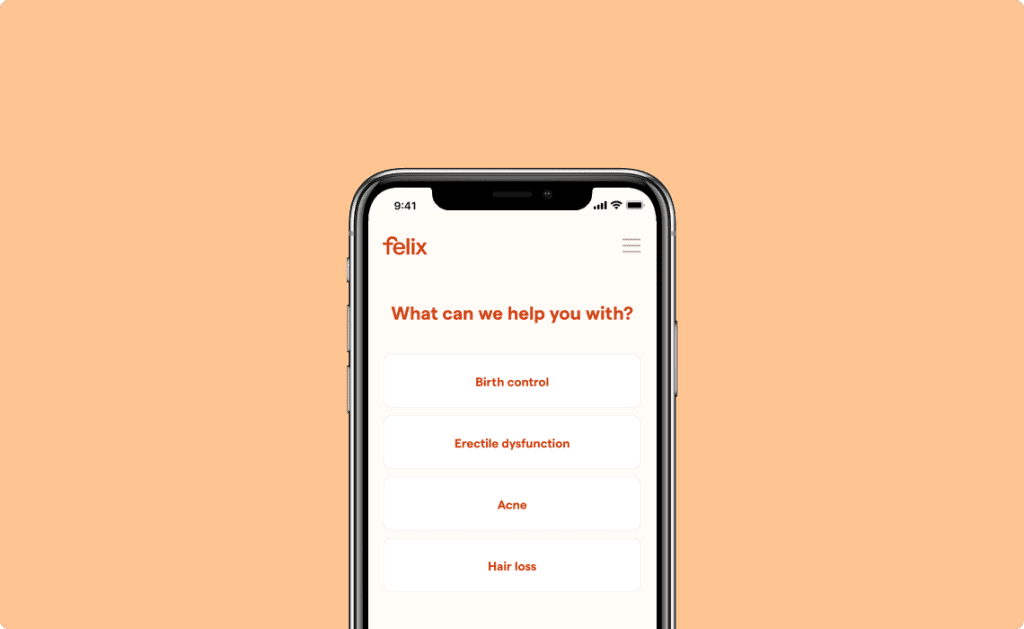While many businesses have suffered immeasurable economic damage in the wake of COVID-19, other companies and industries have seen a surge in activity and growth, like those in healthcare and video conferencing. Felix is a virtual healthcare company that was born in the months before Coronavirus, and may emerge from the rubble as a leader in a growing industry. For them, the pandemic has accelerated the dialogue around accessing healthcare online at a time where society is limiting social interaction and trying to reduce waiting room strain for non-emergency situations.
Led by Mantella Venture Partners with participation by BrandProject, H Ventures, and a handful of strategic partners and angel investors, Felix has raised a total of $3.4M and services all of Canada, except Quebec (which it hopes to be in by the end of 2020.) With a mission to empower patients and make the Canadian healthcare experience more seamless, the company currently offers online prescriptions and delivery for medications like birth control and hair loss treatment in a discreet, safe, and easy way.
In the latest of our #BSBStartup series, Editor-in-Chief, Lance Chung, speaks with Felix CEO and co-founder, Kyle Zien, about how he built the company, corporate leadership in the COVID-19 era, and why the patient healthcare experience needs to be reimagined.
You’re the co-founder of Felix. Tell us a little more about your company, what do you focus on?
We started this journey on Felix a couple of years ago. We worked a tremendous amount on building a scalable business that is rooted in a lot of regulatory and legal complications, which was the better part of our focus for the first year. We officially incorporated the business in January of 2019 with my co-founder Emma Stern, and went to market around June, 2019. For us, the mission was always pretty simple. We were looking to reimagine the healthcare experience in Canada and look at it through the lens of a more modern and direct-to-consumer approach. It’s our objective to give the patient control, put them at the centre, and really design an experience with the patient in mind. By nature of that, we want to help break down some stigmas and create levels of access to healthcare that we feel, in certain health categories, are really needed in Canada.
To sum it up, we’re about access, education, and helping people get the prescription medication or treatment that they need to improve their quality of life, and to do that in a way that works well for them.
You mentioned stigmas. What are some associated with accessing healthcare in a virtual setting?
One of the ways that we do that is with our physicians, who are happy to talk about anything and are very nonjudgmental, but also our process itself, which has an asynchronous quality to it. You’re not actually talking on a video chat with a doctor and because you’re coming in for a very specific health issue, like birth control as an example, we’re able to ask you all the questions in a beautiful user experience. So, you can do it in your pyjamas. You don’t need an appointment. It gives you that distance without compromising on safety because we standardize that process. We ask you every single question that needs to be asked, medically-speaking. The same is required on the physician side. Once you’ve submitted your online assessment, you then hear back from the doctor and you can chat with them in such a way that I think for some people is more comfortable.


You can access Felix as a website, but it’s designed for mobile use and it’s very seamless. We may have an app in the future, but right now it’s just not part of our roadmap.
Let’s use a category as an example. Let’s say that I’m interested in birth control and I’m either someone where I already know what I use and it’s been working for me for years, or maybe I’m looking for something new, or I’ve never used it before. You would come to Felixforyou.ca and then you would start your online visit for birth control, which is basically our unique version of a doctor’s visit. For the user, you would set up your profile, and do your medical quiz for birth control via a well-formulated and designed series of questions specifically for birth prescription requests. Part of that process, which is obviously encrypted and extremely secure, is giving information about your personal health history and your lifestyle, which is then collected and shared asynchronously with a doctor licensed in your province, whom you get to know. That doctor is then going to take your information almost immediately and review it. If they have any questions for you, they’re going to reach out through Felix’s encrypted chat tool and then you can chat with a doctor. Once your prescription has been approved, if safe and if eligible, then that prescription essentially is digitized and goes to our pharmacy partner for fulfillment, and then delivery.
What we’re really presenting here is a unique end-to-end user experience in healthcare, which doesn’t really exist. It’s not just about the doctor’s visit, the product, or the pharmaceutical, it’s about integrating that experience all the way through for a single therapeutic category. We’re trying to help you with your birth control visit from end to end. Lastly, as a Felix member or as somebody who has a prescription with us, you also then have access to your doctor as long as you’re active. You can ask your doctor questions, you can message the doctor, and you can do that in perpetuity. The same is true for our pharmacy side, who you can talk to whenever you want to.
Is this an in-house pharmacy or a pharmacy partner? Or can you take your prescription to a pharmacy?
With a patient-first mentality, it’s all up to the patient. You can choose to have your prescription sent to a pharmacy of your choice, any pharmacy, and we will facilitate that for you for easy pickup. Or, you can choose to utilize the Felix pharmacy network for easy delivery. That will give you two-day delivery and it’ll arrive to your door, or to your office, and it’s completely discreet. It’s ultimately up to what makes the most sense for the patient. For a lot of people, delivery is more convenient when you’re dealing with a medication like birth control for example, where you may be taking it for five, eight, or 10 years, and you just really want to eliminate that one thing that you have to do that’s kind of annoying. For some people, they prefer to pick it up from their own pharmacy.


I have a history of being entrepreneurial and Felix is my third venture. Previous to Felix, I co-founded a company called Mantry, which is based in New York City and is a food subscription business. I learned a ton from that company. I learned about building a company in Canada. I learned about building a business in the US, and I learned a lot about marketing, acquisition, PR—all of those things that really drive a direct-to-consumer business. It was definitely those learnings that translated well into our mission at Felix. With Mantry, that was a business that we bootstrapped and Felix, this is a business where we’ve actually raised venture capital.
Why did you decide to tackle an industry as complex as healthcare?
For me, it was personal. In the beginning, I was interested in the healthcare space as a whole. I became more interested in my own personal healthcare as I was maturing as an adult, and having had the opportunity to live and work in the US and Canada, I was also very interested and drawn to the stark differences in our healthcare systems. I think that led me down the road of ideation and very quickly, I met our co-founder Emma. One of the things that we are both obsessed with is that Canada is so unique in its approach to healthcare, and it’s got an amazing world class healthcare system. We felt like there were things that could help improve people’s level of access, and that was something that we were really interested in tackling as a problem. Once we got that idea in our head, it was time to get to work and figure out how we could create a more modern direct-to-consumer user experience around healthcare, and how could we do that safely and in a scaleable way.
You have a direct-to-consumer model, but I imagine there’s a lot of back-end infrastructure that needs to be built from a B2B standpoint. How do you go about recruiting doctors and making sure that they’re the right ones for you?
It was extremely important for us to build a business for the long term, do everything right, and never compromise on anything. We went to work in trying to establish an amazing support network of physicians, specialists, and pharmacists. It was definitely challenging, but I think a lot of the folks that we were able to eventually get support from ultimately believed in the mission of Felix, and also believe that in Canada (and in many countries) healthcare is one of the last major categories that has in some ways not been meaningfully disrupted by technology. Of course in many ways it has been, but I think from a patient experience or direct-to-consumer perspective, it really hasn’t. A lot of the medical specialists that we’ve now aligned with have really shared that vision of how we can use technology, medical experts, user experience design, and entrepreneurial spirit to do things that can really help improve the system, or at least improve the patient experience and create wins for everybody.
It’s a very challenging time for people and businesses right now. From the standpoint of a healthcare company, how are you guys doing? How have you been impacted by COVID-19?
I think this is a time where companies need to be careful and really think through the way that they may be able to respond to something like [COVID-19.] It’s obviously unprecedented. It’s a day by day thing, and things are changing by the minute. We’re trying to remain as agile as humanly possible. We’ve taken a very cautious approach to it and tried to remain true to our roadmap and our business. We’ve also tried our best to help where we can. The reality is that this landscape is ushering in a lot of thought and exposure to online healthcare in general, as a category. There’s a lot happening where people that generally have access to family doctors or clinics, or just easy access to the pharmacy—that doesn’t really exist to the same extent that it did. Naturally, I think people are more interested in learning about and discovering online healthcare as an option. Virtual healthcare does have the opportunity to help. If we can help people that can’t access a doctor and get them the treatment that they need, or avoid a pharmacy, I think that’s great for isolating and potentially reducing some strain on the healthcare system. We’ve just tried to stay focused on our value proposition, which is helping people access prescription healthcare that is important to them. We made our online visit free for a period of time during this crisis, which was hopefully something that gave people access that they really needed at that point in time. And we’re continuing to provide a substantial discount on our online visit to help people lower that barrier of access for them.
How does your pricing structure work?
There’s a $40 fee for the online visit, which is basically your doctor’s appointment fee. That typically garners you a prescription for the year, and it’s a one-time fee. As your prescriptions come up for renewal, those are renewed at no cost. It really just helps compensate the physician for their time, et cetera. In the meantime, we’ve then moved to a free visit altogether, and now to 50 percent off.
For a lot of people, talking about sexual health with a stranger isn’t comfortable and not being judged is important.
What examples of corporate leadership have you seen in the community that serve as a good response to COVD-19?
I think businesses that try to immediately become opportunistic and capitalize on a situation like this, it’s always a bit of a mess. Examples of leadership that I’ve seen are businesses that have been very careful about how they position their messaging and have been extremely supportive to their employees. They’ve kept a level head in a world of uncertainty where every day something is changing. When there are opportunities to give your clients or consumers the opportunity to interact with your product in a way that’s more affordable to them, as long as it’s something that you can afford and sustain, I think it’s definitely the right thing to do. Overall, we’re seeing a lot of business leadership in Canada. It’s been great to see. I’m inspired by it every day. I think it’s incredible. It’s so amazing to see the creativity that entrepreneurs have. It’s what we have to do.
As a company, especially now, what would you say are the values that you stand by in the work that you do and how you operate as a business?
I can tell you right now that our leading value is that patient care comes first. It’s all about putting the patient at the centre of everything we do. Stemming out of that come values that are really important to us like transparency, trust, and being forward thinking. Another important one is an ability to talk about things in a way that feels a bit more accessible than they have in the past. That comes back to my point previously about trying to break down stigmas, and create conversation and discourse in subject matters that maybe people are uncomfortable to talk about. It’s about supporting people so that they realize that it is okay to talk about these things and everybody’s in it together. It’s all about patient care and patient experience, and out of that, supporting our circle of care, which are doctors and pharmacists.

What do you see as the biggest potential for growth within your company, and I guess in the bigger picture, the future of virtual healthcare and the patient experience?













